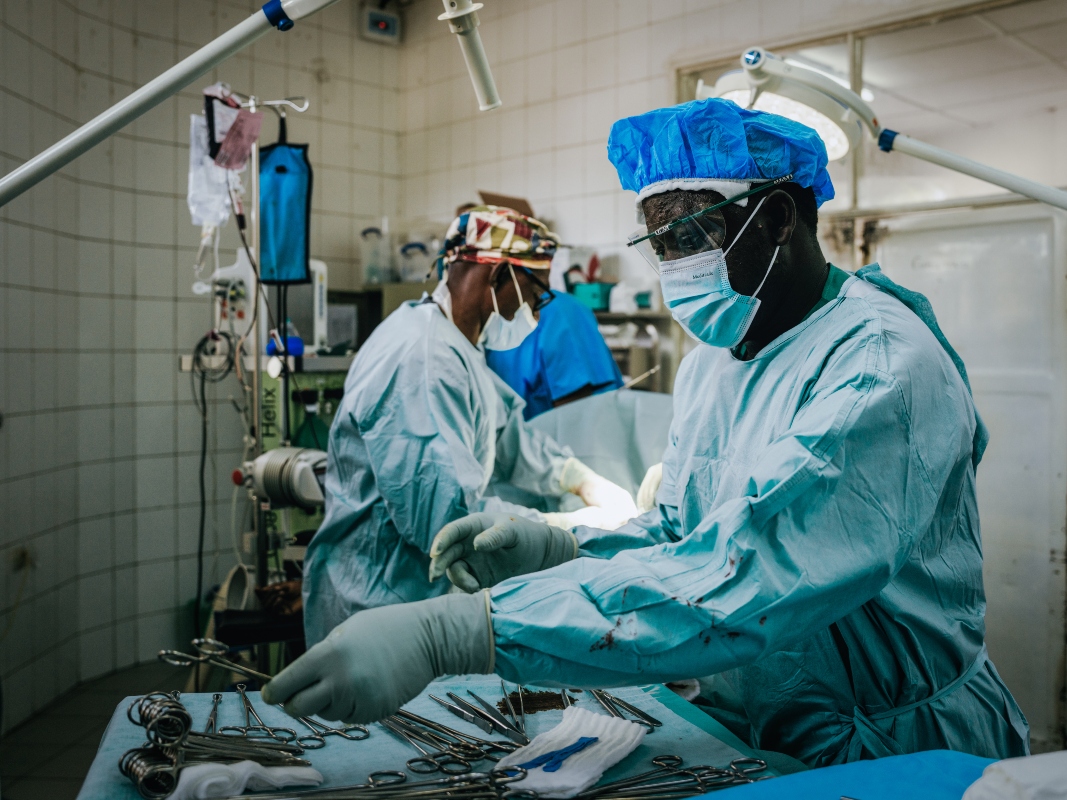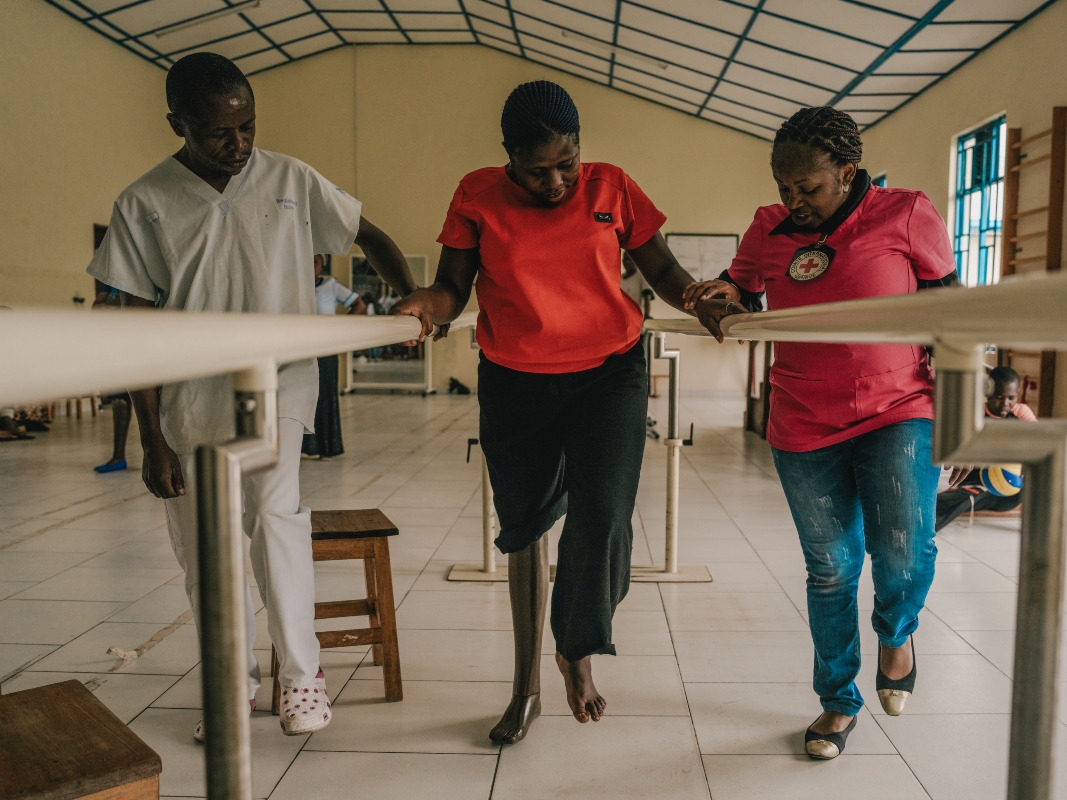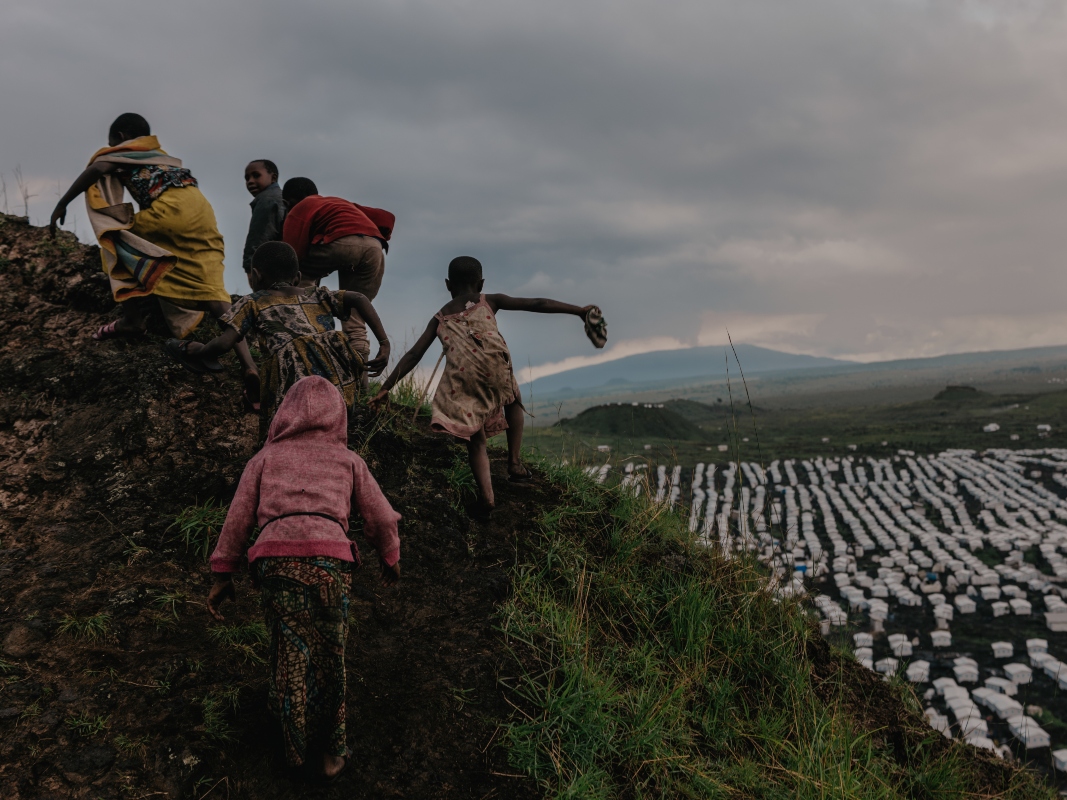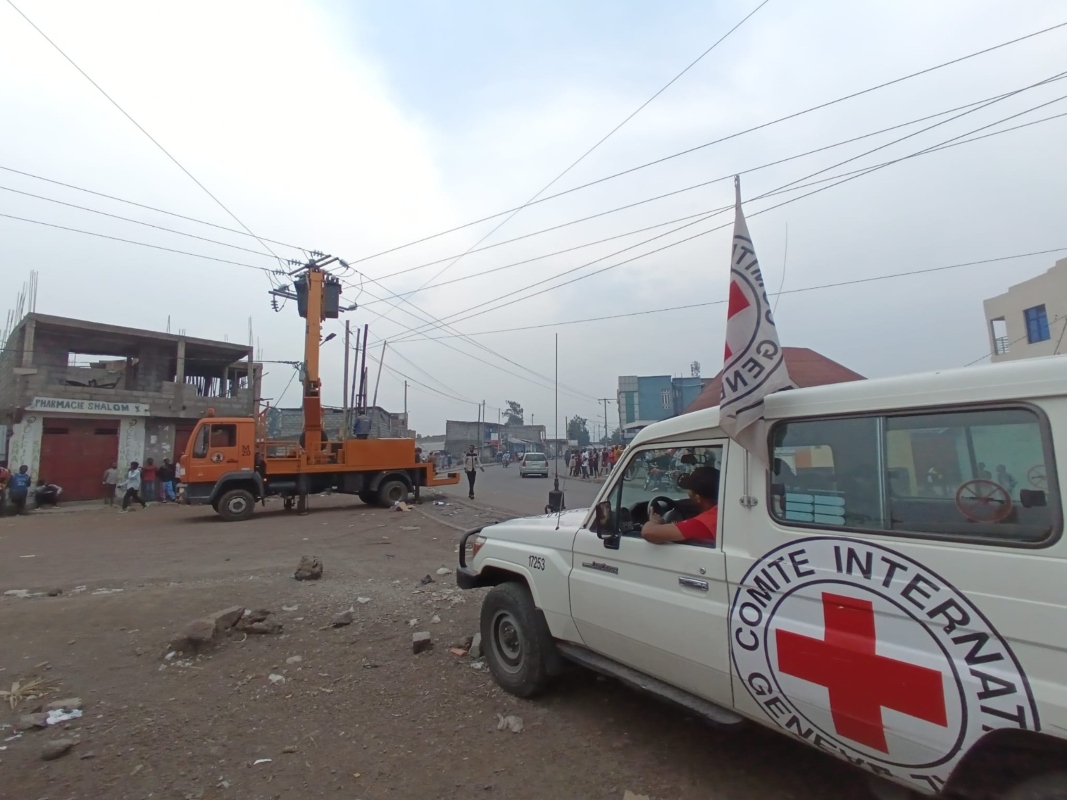In a country of more than 100 armed groups, the Democratic Republic of Congo has one of the most protracted and forgotten conflicts in the world. In the latest Intercross episode, we ask what the recent hostilities that started around December mean for the more than 4.5 million people who have been forced to flee their homes? And what is the ICRC’s response? In this episode, we hear from Francois Moreillon, ICRC’s Head of Delegation in Kinshasa, the capital of the DRC.

Surgeons in hospitals around Goma are overwhelmed with more than 1500 civilians being injured in the fighting in the first month of 2025. That is more than all injuries than they witnessed in 2023 and more than 50% of those they saw in 2024. (Hugh Kinsella Cunningham / ICRC)

Many individuals wounded by the fighting will need multiple surgeries and require limbs. ICRC is providing prosthetic limbs to 180 war wounded people in Bukavu, which is also experiencing an uptick in hostilities. (Hugh Kinsella Cunningham / ICRC)

ICRC workers unloading medicines at Ndosho Hospital in Goma. Inside, victims of bullets and shrapnel lie on mattresses and others on the floor as they fill rooms. Francois Moreillon, head of the ICRC’s delegation in the DRC, says this and other hospitals the ICRC supports are already overwhelmed and he’s concerned about their capacity.

Children climb the sides of an extinct volcano crater over the Lushagala camp, home to over 10,000 displaced civilians. As conflict rages across Eastern Congo, civilians who have already experienced over 30 years of war trauma have been increasingly targeted by artillery. (Hugh Kinsella Cunningham / ICRC)
Important Links
DRC: The ICRC condemns attacks that left many civilians in North Kivu wounded or dead
DRC: ICRC helping to restore essential services in Goma
Read the episode script here
[BONESSI] In a country of more than 100 armed groups, the Democratic Republic of Congo has one of the most protracted and forgotten conflicts in the world.
The latest outburst of hostilities began around December of 2024, but the International Committee of the Red Cross has had a presence in the country for well over three decades of conflict.
Today we ask what these recent hostilities mean for the more than 4.5 million people who fled from their homes in the eastern part of the country, upended their livelihoods, or were wounded amidst the fighting. And what is the ICRC’s response?
I’m Dominique Maria Bonessi and this is Intercross, a podcast that offers a window into the work of the ICRC and shares the stories of those affected by conflict and other situations of violence.
[INTERCROSS MUSICAL INTERLUDE]
[BONESSI] Today I’m sitting down with Francois Moreillon, the ICRC’s Head of Delegation in Kinshasha, the capital of the DRC. Francois has worked with the organization for more than 20 years in places like Yemen, Afghanistan, and South Sudan.
______________________________________________________________________
[BONESSI] Thank you so much, Francois, for joining us. I really appreciate your time.
[FRANCOIS] Thank you for having me.
[BONESSI] Can you first give me a little bit more information about the context of the Democratic Republic of Congo? This conflict is the most protracted and forgotten in the world. Why is that?
[FRANCOIS] First, let me locate where Democratic Republic of Congo stands in Africa for those listeners that may not know the country. So it is located in central Africa bordered in the South by Angola, to the North by Central Africa, and to the East by Uganda, Rwanda and Burundi to name just a few.
The country has been experiencing armed conflicts for the last three decades, which explain why it is often considered as a protracted crisis which has affected, especially the east part of Congo where, as we speak the province of South Kivu, the province of North Kivu and Ituri are the provinces, the most directly affected by armed conflict.
It counts with over 150 armed groups and local institution have been very much weakened by those three decades of armed conflict with basic services, needed by the population, not being up to the standards they would expect. And this also explained why there is a need for important role by international actors such as the International Committee of the Red Cross as a strictly neutral, independent and impartial humanitarian actor. You also have to comprehend that it is a region that has witnessed millions of people being displaced because of ongoing fighting. We have seen situation of sexual violence being very predominant in this region, child recruitment as well.
[BONESSI] Can you talk a little bit more about this most recent uptick in hostilities that we’re seeing within this protracted conflict?
[FRANCOIS] We witnessed new dynamic in the conflict starting in March 2022 with an armed group named M23 confronted the F-A-R-D-C so the army of DRC especially in North Kivu. And this situation has been ongoing, but effectively went through an uptick beginning of this year in January, when the ceasefire that was agreed was broken and
brought quite a significant increase of instability in the region.
It started with a territory called Masisi in North Kivu, where the central town of Masisi witness an increased fighting and was taken. Soon after the fighting reached the outskirts of Goma in a place called Sake but also in other places around the city. And there we witnessed a level of intensity that we had not seen for many years. And probably the level of intensity has no similarity in the country in the last 30 years. The ICRC there quickly stood ready to assist the victim of these armed conflict. With supporting several hospitals, one being in Goma another one in the city of Beni, and a third one being in Bukavu, which is the capital of South Kivu. And all witnessed an influx, a large influx of war wounded very soon in the conflict. when the combat reached Goma, which is a very densely populated city counting with close to 3 million people living there, among which close to 1 million IDPs or internally displaced persons. We were receiving between 100 up to 150 wounded a day. And what is interesting to note is the numbers of civilians being affected is something around 10 up to 20 percent of the wounded were civilians. But this figure went through a complete reversal when the fighting reached the city.
And the number went up to 90 percent of civilians being affected. And here I’m talking about children. I’m talking about women as well as elderly and other civilians. So this of course was a cause of extreme concern. We did increase our capacity to take care of those wounded. But just to give you an idea of the magnitude of and the intensity of this conflict is that if you look at the numbers we have taken care of between the 1st of January up to the 10th of February, we’re reaching some 1, 500 wounded, which is higher than the all year 2023 and it’s over half of the total number of well wounded we take care of in 2024, where we already had witnessed an increase in intensity. So you can imagine how difficult it was for our team to work in such an environment.
[BONESSI] It seems like there is a very limited number of hospitals that are full functioning can you talk a little bit about that?
[FRANCOIS] The problem is because of the fighting most of those structures have been abandoned by the staff because of the safety. Some structures had received missiles on them. That meant we started receiving all cases. We had to do the triage in front of the hospital, which added to the pressure our team was faced with. Due to the increasing number of wounded we started also to mobilize other actors to also get active in this response. All together I think there are some six hospitals that are offering services to war wounded, but all are completely overwhelmed right now. This is a very important priority for us is to find ways to diminish this pressure as I’m speaking for example with the two structures, we have in Goma we have over 500 wounded. We have people lying on the floor being wounded and we have no other options you know. And we look at addressing the most pressing issue, but in conditions that are extremely difficult for the patients for sure, but as well as the team that are working days and nights to address those needs.
[BONESSI] Going to the physical rehabilitation programs we have several people in this conflict who are, and just like many conflicts, have lost limbs, and, need prosthetics and need assistance learning how to walk again. Can you talk about What is your capacity there, and how are you able to handle the load of the number of people that you’re seeing who have had loss of limb?
[FRANCOIS] We have a capacity but it’s clearly going to be overwhelmed. We don’t have, as we speak, the picture of what the needs are becoming because we still receiving tens of wounded every day. It’s clear that down the line these people who are now handicapped by this situation will require these services, not to mention many of those cases will not only need one surgery but several. Many patients will not be able to come out of our hospitals before potentially six months. The problem is that patient are accumulating and our very concern right now is that if the fighting resumes to the same level of intensity reaching out Bukavu, which is the capital province of South Kivu, where right now most of the fighting are taking place this can be completely catastrophic.
We have a program there and we have taken some a 180 war wounded, I believe, in charge in Bukavu, but if we were to face similar situation as in Goma we will be very soon be overwhelmed. It is clear that fighting taking place in a densely populated area is going expose those population and this needs to be protected. Health services also need to be protected because during the fighting we are aware of several ambulances that were hit by gunshots, also medics that were hurt because of the fighting.
[BONESSI] You mentioned child soldiers either being recruited or offering to fight voluntarily. Can you talk more about that? What are we seeing and what are you asking parties to the conflict to do?
[FRANCOIS] Well, the problem of child recruitment has been an inherent problem in the 30 years of conflict that we have witnessed overall in DRC. Some actors took efforts based on the recommendation that were provided, but that’s not, does not say that all did. And what we have witnessed is an increase in child recruitment, given the intensity of the
conflict as well, because children are often an the easy target to recruit. But what we have witnessed recently is that they have been exposed to fighting far more than in the past, because in the decades that we witness they were often used for carrying luggages making food and not systematically involved in the fighting. But this time it has been the case and
they are dying on the front line, and they are being exposed to a trauma that they will carry for the rest of their life.
So yes, this is a message that we have been consistent in sharing with those actors that have been involved in child recruitment and it is obviously an issue of major concern and that contradicts and represent the violation of international humanitarian law. I was last year in Masisi where I met with several, seven children that had left to a transit center one of the armed actor present in the area and the story they told me was quite striking. I mean, All of them had joined for various reasons.
One was because friends of his came to recruit him explaining that he will regain his pride, that he, he will have access to wealth and so on and so forth. And what he discovered was something completely different. Another had been forced in following fightings. So you, you have as many examples including some that will join because they want to defend their, their community.
But again, the responsibility of armed actors is to respect international human rights and lawand prevent children to join their rank. And again, we should not diminish what this kind of scar means for these children and what kind of men they will become and what impact it has on the community.
[BONESSI] You mentioned institutions, systems being worn down by the protracted conflict. Can you go a little bit into the humanitarian consequences you’re seeing around the city of Goma?
[FRANCOIS] First one I can mention and that has kept us awake at night was the Laboratory of INRB, a research center that is looking at the Ebola Virus. We were informed quite early on that when the fighting reached Goma that these premises were lacking oil to keep the engine and the cold chain, you can imagine what the risk could have been if the cold chain was broken Moreover, there were a lot looting during this period and if it was visited by individual looking for goods they would not have aware of risk they were taking and they would have expose the community and beyond. So when we were inform of that, one of the things we did was to immediately send a team over there to secure the cold chain, refurbish the oil, and put clear a Red Cross sign over the premises, so it couldn’t be confused with a military target because as well if the structure had been targeted it would have presented an important danger to the community and the population around.
If you look at the consequences of the fighting that took place in the city it cut all sources of electricity in the city leading to complete breakdown of the water system so you can imagine yourself in a city that is counting over two million people without water and electricity, in a region that is exposed to cholera, but you also have M-Pox right now. For us
we immediately looked at providing solution for the communities we did collaborate with local technician and we managed to fix–as soon as the fighting stopped–in the immediate vicinity where we were to fix this electric system and providing electricity to over seventy 70 percent of the city. This also allowed us to restart the distribution of water in part of the city. The remaining part of the city that was still without electricity is where you have most of the water production unit, so this is something we are working right now with the local technician authority…to fix that but that is to go in very exposed area accompanying them for the security in order to help allow them to fix the problem and we have been doing that for the
last seven days and we assume that it will take four additional day to hopefully be able to fix that and to reinitiate the water for the rest of the city which is obviously public health issue.
[BONESSI] I wanted to ask about your colleagues, and I hope they’re well and I hope they’re safe, but can you talk about some of the challenges they’re facing right now?
[FRANCOIS] First of all I’d like to praise them for the amazing job they’re doing day and nights, and exposing themselves to great danger sometimes working in a very difficult situation like at the height of the fighting you know they were lockdown in a bunker we had established we could hear the shelling we could hear the gunshots . This was very impressing on them you know and as soon as the fighting started to diminish, they were the first to come out you know and collecting wounded with the Congolese Red Cross that the volunteers that are doing an amazing job has buried over 550 dead bodies.
Our Surgical team that had been working days and nights and you know trying to manage also to keep the people with weapon outside the hospital there is a lot of tension people exhausted they arrive they’re looking for their loved ones. They trying to be treated now and you need to explain to them, “no you know they need to wait and we need to make a triage.” So you have all those very stressful situations that they have managed extremely well I must say.
[BONESSI] Do you have a message to the international community that you’d like to leave people with?
[FRANCOIS] My first message would be a message of compassion and to say to the international community that these people deserve more attention. I’d also like to raise the plight of the Congolese people faced with that situation. They will need more humanitarian aid and assistance given the intensity of this conflict, but this will only be feasible if we receive additional funding.
A second message will look at weapon bearers. They need to take more preventive measure to limit the consequences of the ongoing fighting on the population. Andthis, especially in urban, densely populated area. I mean, the fact that we reach at some point up to 90 percent of civilian being wounded is simply unacceptable, unacceptable.
A last point will relate to the respect for the humanitarian actor. It is essential that humanitarian actors be respected, that they are allowed to move freely and that their action is taken for what it is, a humanitarian response to a terrible situation.
[BONESSI] That was Francois Moreillon with the ICRC’s Delegation in Kinshaha in the Democratic Republic of Congo.
Thanks to Halimatou Amadou, Eleonore Asomani, and Paulin Mushamuka for helping make this episode possible.
If you’d like to learn more about our response to the conflict in the DRC please visit our website, that’s intercrossblog.icrc.org, or follow us on X.com @ICRC_DC.
That’s our show for today, please if you like the content you get here on Intercross, please do me a favor and rate, review, and subscribe. Tell us what you think about the podcast, are there particular contexts or issues you think we should talk about.
See you next time on Intercross.

